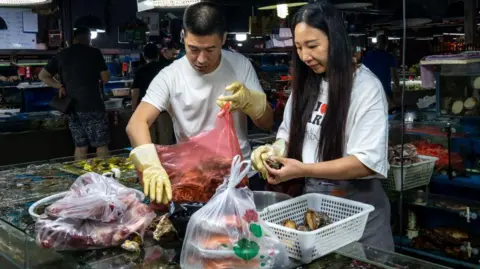China partially lifts ban on Japanese seafood imports
 Getty Images
Getty ImagesChina has lifted a ban on seafood imports from most regions of Japan, which was imposed two years ago due to concerns over the release of treated waste water from the Fukushima nuclear plant.
Beijing said it will "conditionally resume" the imports from Japan with the exception of 10 of the country's 47 prefectures, including Tokyo and Fukushima.
Samples collected over long-term monitoring of nuclear-contaminated water from Fukushima had "not shown abnormalities", China's General Administration of Customs wrote on 29 June.
A tsunami in 2011 flooded three reactors of the Fukushima plant in north-east Japan in what is regarded as the world's worst nuclear disaster since Chernobyl.
Three of six nuclear reactors at the plant suffered a meltdown during the tsunami, leaving the facility severely damaged. Over the years more than a million tonnes of treated waste water accumulated there.
In 2023, Japan began discharging the treated waste water into the ocean - a move backed by the International Atomic Energy Agency. The process is expected to take up to 30 years.
Although most experts agree that the release is safe, some scientists say there isn't enough research yet on the potential impact on the ocean.
But Beijing criticised Japan's decision and almost immediately banned seafood from the country, citing environmental concerns and safety fears.
Before that, China had been Japan's biggest seafood buyer accounting for nearly a quarter of its exports.
Japan has said that China's move to partially lift the ban was a "positive" move, adding that the government will continue to urge Beijing to accept seafood imports from all of its regions.
The decision came after Tokyo promised to ensure the safety and quality of its exports.
Production companies that had suspended imports must now reapply for registration in China and would be subject to supervision, officials said.
China and Japan are key trading partners but have long had a testy relationship because of territorial disputes and Japan's occupation of parts of China in the past.
